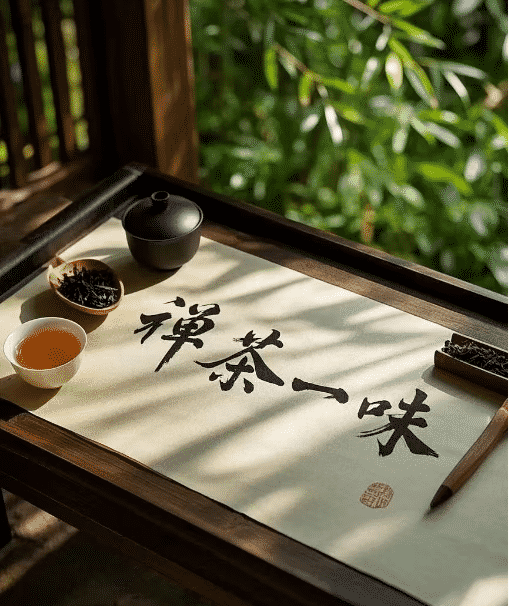Discover the spiritual elegance where Eastern tea rituals meet Zen philosophy—nurturing mindfulness, inner peace, and authentic living.
I. The Zen of Tea: A Practice Rooted in the Present Moment
In the vast landscape of Eastern culture, tea and Zen are like twin pearls—subtle, serene, and deeply interconnected. Threaded by the quietude of the mind, their harmony creates a spiritual sanctuary amid the noise of modern life. When the world moves too fast, tea and Zen offer a place of refuge for the soul.
Brewing tea is itself a meditative ritual. As boiling water touches the tea leaves, they unfurl like the petals of a wisdom flower—revealing stillness in motion. Each step in the tea-making process encourages calm, focus, and reflection. As the leaves settle, so too do the troubles of the mind—echoing the Zen teaching of finding peace within chaos.
Drinking tea with intention means being fully present—savoring the flavor, the aroma, and the moment itself. This embodies the Zen principle of Ichigo Ichie (一期一会): “one time, one meeting.” Every cup of tea is a once-in-a-lifetime experience, worthy of complete awareness and reverence—just like every breath in meditation.
From ancient temples to humble tea rooms, tea and Zen have always shared the same breath. Monks calm their minds through tea; tea practitioners attain clarity through Zen. Whether harvesting leaves, preparing the brew, or sipping in silence, the entire tea journey becomes a path of everyday enlightenment.
II. The Shared History of Tea and Zen: A Cultural Interweaving
The story of tea and Zen is one of profound cultural resonance. As early as the Tang dynasty, the revered Master Yongjia introduced formal tea ceremonies into Zen monasteries, infusing the halls of meditation with the gentle aroma of tea. From this tradition emerged countless poems, teachings, and artistic expressions inspired by the marriage of the two.
In the Classic of Tea , Lu Yu describes tea as “the sacred art of boiling, the essence of fire and water.” Just as Zen practice unfolds gradually through mindfulness, so does tea reveal its true flavor through careful preparation and deep presence.
Tea gatherings became a symbolic space for spiritual connection—“using tea to meet friends, using Zen to express the Way.” As Qing scholar Yuan Mei wrote in his Suiyuan Menu, the beauty of tea lies not just in taste, but in how it reflects the human experience.
In today’s fast-paced world, the core values of Zen and tea culture—peace of mind, harmony with others, and simplicity—feel more essential than ever. Zen invites us to still our inner chaos; tea invites us to connect gently with ourselves and those around us. Together, they offer a spiritual harbor in uncertain times.
III. Tea and Zen Today: Living the Aesthetics of Authenticity
Today, the fusion of Zen and tea has become a mindful lifestyle. Whether crafting a quiet tea space in the city or sipping tea amidst mountains and rivers, people are rediscovering a slower rhythm—where fragrance becomes meditation and silence becomes sanctuary.
Savoring tea is more than a sensory pleasure; it is a way of contemplating life’s flavors. Likewise, meditation is no longer limited to mountaintops or monasteries. As Zen teaches: “Still the mind, and the truth reveals itself.” A simple tea session, performed with care, becomes an act of inner clarity and outer balance.
Tea supports Zen practice; Zen deepens the meaning of tea. Their union paints a uniquely Chinese cultural landscape—where the spiritual and the sensual meet. For the modern soul, this union offers a path to slow down, breathe, reflect, and return to what is real.
Conclusion: One Cup, One Heart—The Taste of Zen Tea
May you and I both find, within a single cup of tea, the mirror of the Zen heart. May we taste in its stillness the essence of “Zen and tea as one.” This timeless wisdom of the East is not just a tradition—it is a healing balm for our restless modern minds.
Let tea be your daily pause. Let Zen be your compass. And let the practice of both nourish your spirit, calm your body, and awaken your true self—in every moment, and in every sip.
